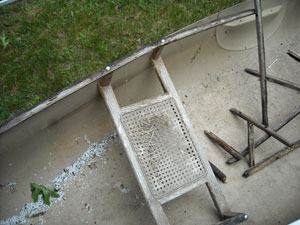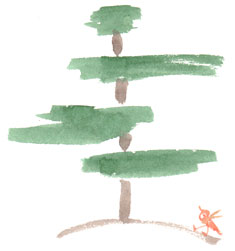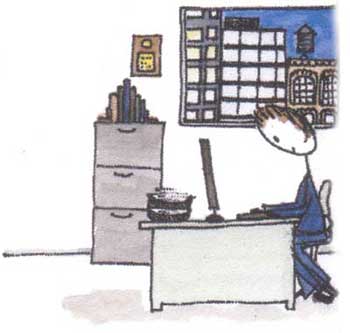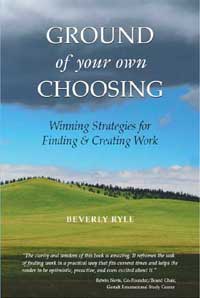Tag
The Dumpster

This summer something wonderful happened—a one-ton dumpster arrived in my driveway empty at the beginning of June and was taken away full two weeks later.
I hailed its arrival because it offered a solution to a problem that had eluded me for years—how to get rid of debris I hadn’t been able to take to the town dump because it wouldn’t fit in the car—an insect-eaten picnic table, a pile of scrap lumber from a defunct tree house, the remnants of a bathroom vanity we'd replaced last year.
My husband doubted there was enough of this unwanted stuff to make it worth the expense of a dumpster, but I didn’t care. I was tired of looking at things that no longer served a purpose in our lives. They were blocking the view, not only of what my environment might look like, but of how I wanted to live in it. Clearing had to happen before something new could be created.
Shared Vulnerability
 What if every time I de-cluttered, picking up shoes, books, dishes, etc., instead of grumbling about it I paused to remember the recent tornado in Moore, Oklahoma and reminded myself that if I lived there I might have nothing left to put away?
What if every time I de-cluttered, picking up shoes, books, dishes, etc., instead of grumbling about it I paused to remember the recent tornado in Moore, Oklahoma and reminded myself that if I lived there I might have nothing left to put away?
What if, after listening to a discussion about nuclear proliferation in unstable countries halfway across the world, I closed my eyes and allowed the realization of the potential we have to destroy one another to inform how I create peace in the relationships in my life?
What if I looked at the opportunity I have to do the work I know how to do as a great gift, like Mike Leahy, the only person to get a job in the PBS New Hours story about the increasing despair of over-55 job seekers unable to find employment I talked about last month.
Keep Paddling!
 My husband and I own a canoe, but for years the only action we took re canoeing was to talk about how we ought to take it out on one of the marshes or kettle ponds before the summer ended.
My husband and I own a canoe, but for years the only action we took re canoeing was to talk about how we ought to take it out on one of the marshes or kettle ponds before the summer ended.
But we’d got rid of the car with the roof racks and it always seemed like too much trouble to have to figure on a new way to strap the thing on top, so there it sat, season after season, on sawhorses beside the garage.
This year, however, as the tourists began to arrive, I found myself looking at their kayaks with envy, so I told my husband it was time we went canoeing again.
He went to work, cleaning years of accumulated dirt off the fiberglass shell and fixing a broken thwart, while I rummaged in the attic and located the paddles, the life jackets and the dry bag.
At a local outdoor store we found a carrying kit suitable for hauling a canoe short distances and we bought it and drove straight home and loaded Sacagawea onto the car and took her to Salt Pond.
Cape Cod Ice
 Sometimes I’ve just had it with the absurd extremes marketing goes to and I have to stand up and say, "Enough!"
Sometimes I’ve just had it with the absurd extremes marketing goes to and I have to stand up and say, "Enough!"
In the window of a convenience store near my house there is a sign which announces, "Cape Cod Ice Sold Here."
The Cape offers many wonderful things—clam chowder, lobsters, glorious beaches, and cranberries, to name a few—but no one ever returned from a vacation here saying, "I can't wait to go back next year for some more of that fabulous Cape Cod ice." Give me a break!
Go Plant Trees
 I heard some of the best work search advice I've come across in a long time at a career event sponsored by a Boston university where I was invited to give the keynote address.
I heard some of the best work search advice I've come across in a long time at a career event sponsored by a Boston university where I was invited to give the keynote address.
After I spoke, a panel made up of career counselors from the university and a former executive recruiter answered questions from the audience and talked about how they managed their own professional lives.
The former recruiter had recently been elected to a leadership position with a volunteer organization serving professionals under 40 on Cape Cod (a minority here!) and each time she spoke, she would bring up some activity she had participated in with the group.
She talked with unrestrained enthusiasm about spending time the previous weekend, restoring the landscape around one of the Cape's precious kettle ponds, and then she announced:
"If you're looking for a job, go plant trees. You'll probably find yourself digging in the dirt with a bank president or a business owner."
I could barely contain myself!
Being Self-Directed
 With his usual talent for organization and clarity, Daniel Pink, the author of Drive, offers the following tweet-sized summary of the book: "Carrot and stick are so last century. Drive says for 21st century work we need to upgrade to autonomy, mastery and purpose."
With his usual talent for organization and clarity, Daniel Pink, the author of Drive, offers the following tweet-sized summary of the book: "Carrot and stick are so last century. Drive says for 21st century work we need to upgrade to autonomy, mastery and purpose."
In these challenging economic times, it may seem strange to suggest that people are not primarily motivated by external rewards, but Pink makes a compelling case for the fact that internal motivation is what is really driving us, once basic living needs are met.
If you don't believe this can produce something of real value, he is saying, just consider the many open-source Internet initiatives, e.g., OpenOffice.org, Mozilla Firefox, Wordpress, Linux, etc., with new ones cropping up almost every day, run by volunteers who have chosen to put their energy where their authenticity lies.
A Conversation with Beverly Ryle I: Ground of Your Own Choosing
"Looking for work using the old methodology is a form of insanity."
I talk about how I came to write the book, Ground of Your Own Choosing, and discuss its premise, that everything about the world of work has changed—except how we go about finding it.
Reassurance
 I usually look forward to business slowing down a bit in the summer, but this year, when my workload started to slacken, I caught myself starting to worry (probably because I wrote a column about it last month), thinking "What if—?" You know the rest! Right?
I usually look forward to business slowing down a bit in the summer, but this year, when my workload started to slacken, I caught myself starting to worry (probably because I wrote a column about it last month), thinking "What if—?" You know the rest! Right?
So I stepped into my husband's office and asked him for reassurance.
I didn't ask for a review of our financial status, or go into a soliloquy on all the reasons I thought the sky was falling as a way of circuitously trying to get him to convince me I was wrong (a technique I learned from my grandmother).
I simply asked him to tell me we were going to be OK. He did, and I went back into my office and had a productive afternoon.
This incident prompted me to think about how important it is to give and receive reassurance, especially right now when so many of us are under the stress of change and economic pressures.
The Hero’s Journey
When unemployment figures are announced, the media takes up the challenge of trying to show what x% of joblessness looks like in human terms, and the images they choose are predictable—long lines of applicants trying to get into job fairs, rows of jobseekers at computers in job centers busily scanning listings.
These pictures reinforce the message that the right, indeed the only, way to find work is to apply for a job, wait for a response, and hope you get lucky.
Rarely does an alternative approach get noticed, and when it does it is treated as something new and foreign. Take for example a recent story I heard on NPR about a laid-off architect.
Instead of wasting his time standing in line somewhere, John Morefield is making his expertise visible at a booth he has set up at a farmer's market in Seattle. Sandwiched between a fish market and a store that offers locally grown honey, he sells advice to homeowners who are thinking about remodeling—for 5 cents!
He got the idea from Lucy's "5¢ Psychiatric Help" stand in Peanuts, and he is using it to do the best possible thing he can do with potential customers—engage them in conversation about problems they want to solve.
I’ll Take Anything
When you tell people you live on Cape Cod, they often tell you you're lucky, and for three-fourths of the year, they're right.
What they don't know—and you do, after you've lived here long enough to experience a few Aprils when the daffodils seem to shiver in the cold rain and the forsythia refuses to bloom—that there is no spring. Or, to be more precise, what little of it there is comes so late that it imperceptibly merges with summer!
I'm more dismayed by the sunless days and lack of color this year than I have been in the past, and I think it's because of the bleakness of the economic landscape.
The truth is, both here on the outer Cape where I live and in the business world we all occupy, things look pretty brown right now. You have to be very attentive to notice that the willow branches have a slight yellow tinge against the gray, gloomy sky, just as you have to look carefully to see any glimmer of hope in these dark economic times.







